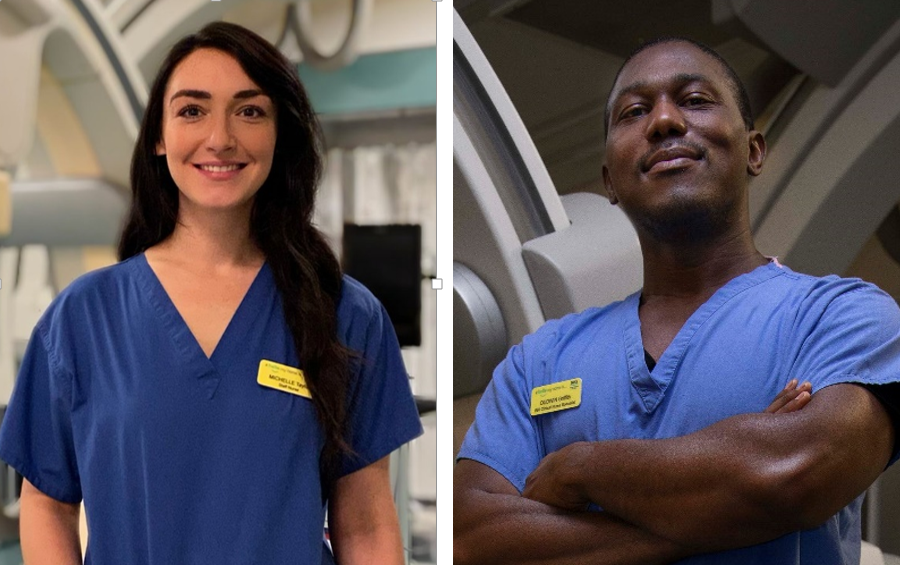
Two members of NHS Greater Glasgow and Clyde’s neuroradiology team have been invited to the world’s largest neurological treatment and research institution following a prize-winning presentation at the British Association of Neuroscience Nurses (BANN) annual conference, held in Glasgow earlier this month.
Oudwin Griffith, Senior Clinical Nurse Specialist, and Michelle Taylor, a Staff Nurse, delivered an oral presentation on a study of a patient recovering following a stroke and an accompanying mechanical thrombectomy.
They have been invited to visit the renowned Barrow Neurological Institute in Phoenix, Arizona, in 2023. On the two-week trip, they will be meeting and sharing knowledge with world leaders in neurological disease treatment and research and preparing for a presentation to the World Nursing Congress in late 2023.
Oudwin and Michelle are part of NHSGGC’s Interventional Neuroradiology team based at the Institute of Neurological Sciences in Glasgow. Last September, the team launched trials in mechanical thrombectomy. The aim of a mechanical thrombectomy is to remove a blood clot from an artery within the brain using a specialised clot removal device. This restores blood flow which minimises the amount of brain damaged during a stroke.
Oudwin identified the trials as the perfect subject for the BANN conference. He works closely with Michelle and knew she would be the right person to deliver their presentation: “I was delighted she took up the challenge. Michelle is a promising young leader, and it is important the NHS does ‘succession planning’ and identifies young staff who are showing real promise.”
By using her personal experience of stroke care, Michelle rose to the task: “I started with a chat about what mechanical thrombectomy is, and how we do the procedure.
“My gran suffered a severe stroke, and this inspired me to become a nurse and want to work with stroke patients.”
The duo were joined by their patient, a 42-year-old nurse who experienced a stroke, and it was her story, delivered in her own words, that made the difference with the assembled audience of clinical professionals.
While Oudwin was speechless upon learning they had been invited to Arizona, Michelle admits she was her focus was telling the neuroradiology team’s story: “We first saw our Amazon vouchers and were delighted – then we learned we had been invited to Arizona. It’s a real honour.”
Oudwin recognises the benefits of mechanical thrombectomy not only in delivering potentially life-saving care, but in helping the NHS in resource management: “Mechanical thrombectomy helps to alleviate some of the financial strain on the NHS. Most importantly, this gives patients a better chance of recovering after a stroke.”
The Barrow Neurological Institute is one of the world’s most prestigious institutes in treatment and research into brain and spinal diseases and injuries. They treat more than 45,700 patients each year and perform more 5,600 brain and spine surgeries annually.
Oudwin cannot wait to get down to work in Arizona. “We will be benchmarking the things we do in Greater Glasgow and Clyde, with departments throughout the world. This will allow us to share our practices and learn from other interventional neuroradiology divisions. “
Lynsay Creighton, Interim Associate Chief Nurse in Regional Services, organised the conference alongside Lead Nurse in Rehab Medicine and Spinal Injuries Marie Austin. She said: “We were delighted to welcome neuroscientists, from across and UK and further afield, to Glasgow. NHSGGC were well represented, and we are delighted for Oudwin, Michelle and the Interventional Neuroradiology team on their success.
“We wish Oudwin and Michelle a safe, enjoyable trip to Arizona and look forward to hearing about what they have learned on their return.”
Susan Groom, Director of Regional Services for NHSGGC, said: “Mechanical thrombectomy can reduce dependency on long-term post-stroke care and may give patients a better chance of recovery. We are encouraged by the results of the trial so far and will continue to follow them.
“By working together with colleagues across disciplines, our neuroradiology team deliver high-quality, person-centred care to patients experiencing strokes.”
